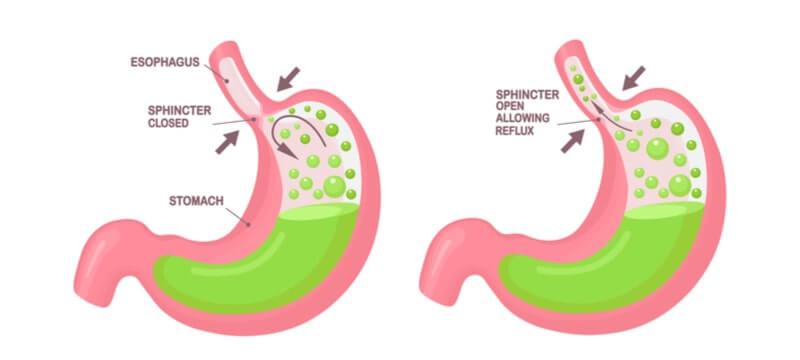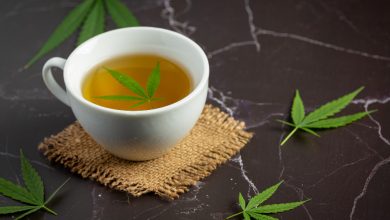
Acid reflux, or heartburn, is a very common condition. It’s that burning feeling of acid creeping upwards from your stomach to your throat. For most of us, it’s an occasional inconvenience. But for many people, it’s a long-term condition that’s difficult to relieve. Medication is an option, but can CBD help reduce heartburn?
Table of Contents
What is heartburn?
Heartburn, also known as acid reflux, occurs when acid from the stomach rises up through the oesophagus. If this happens on a regular, or even a continual basis, it’s called Gastro-Oesophageal Reflux Disease, or GORD (GERD in the US).
There is always acid in the stomach. It’s there to break down food and kill harmful bacteria. Food is then transported through the body to be metabolised. The acid should stay in the stomach, but sometimes it makes an unwelcome appearance higher up. And because this is hydrochloric acid, you feel the burn.
In addition to acid in the throat, acid reflux may cause:
- A recurrent cough or hiccups
- Hoarseness
- Bloating
- Nausea
- Bad breath
Your heartburn is likely to peak after eating, but also when lying down and bending over.
What causes heartburn and acid reflux?
When everything is working normally, the lower oesophageal sphincter relaxes to allow food into the stomach. Then it narrows to stop food and acid flowing back to the oesophagus.
Acid reflux occurs when the lower oesophageal sphincter is weakened or fails. This enables the stomach contents to rise back into the oesophagus.
We know the mechanism of heartburn – how it happens – but it’s not clear exactly why it happens. Heartburn is often triggered by certain foods or physical conditions, for example:
- Eating spicy or fatty food
- Drinking coffee or alcohol
- Certain food, such as tomatoes and chocolate
- Pregnancy – heartburn often disappears after birth
- Being overweight
- Smoking
- Anxiety or stress – or ‘nervous stomach’
- Ibuprofen and anti-inflammatory painkillers
- Certain medicines
- Hiatus hernia

Billion-dollar medication industry
Millions of people around the world experience occasional mild heartburn or long term GORD. It’s easy to reach for an over-the-counter antacid medicine or tablet to relieve the symptoms. These remedies are cheap and easily available and can offer temporary relief.
Antacid tablets or liquids are found in most household cupboards, as well as many handbags and office drawers.
Of course, stronger medications are available on prescription. The demand for relief from such a common problem had built a global market worth US$5.66 in 2016. However, people who take these medicines and remedies often feel they provide only temporary relief. They often tackle symptoms rather than the root cause, and can have side effects.
On the other hand, CBD has very few and only minor side effects, even when taken in large doses. CBD reputedly has potentially remarkable effects on the body, so can it work for heartburn?
How does CBD work in the body?
CBD interacts with the human endocannabinoid system (ECS). This system plays an essential role in regulating and managing vital bodily functions. The ECS is a series of receptors found in the brain, nervous system, organs and tissues. They can be divided into the two largest (and most studied) groups:
- CB1 receptors that influence functions such as mood, sleep and memory.
- CB2 that work on immune response and inflammation.
CBD can react with the ECS to alter the body’s natural reaction to inflammation, pain and mood. It also has a range of supposed health benefits.
What are the reported effects of CBD relating to acid reflux?
Acid reflux is associated with inflammation. This can occur in the oesophagus, or the throat in reaction to the acid flow, or in the stomach. A 2016 animal study found that CBD could reduce inflammation in the joints. But inflammation elsewhere may also be calmed with CBD. A 2017 review of research found CBD may help manage inflammatory bowel disorders.
A further review reported that CBD acts on the ECS that regulates the gastrointestinal region. In particular, it may influence the spontaneous movement (motility) of muscles like the one that controls the stomach entrance.
Therefore, taking a regular dose of CBD may be of benefit to people with acid reflux. It may help to control or reduce gastrointestinal inflammation and the discomfort that causes. Research also suggests CBD might reduce or limit the amount of acid in the stomach.
CBD oil and pain
Heartburn is not generally considered a painful condition, but the continual washing of acid back through the oesophagus may lead to inflammation. This could indirectly lead to throat pain and possible stomach discomfort.
CBD has been investigated for its pain-relieving properties. Anecdotal evidence certainly suggests that it is effective in managing pain all over the body. CBD works on the endocannabinoid system, which can create a number of effects.
Therefore, someone taking CBD, believing it may manage pain, might also experience a reduction in stress. Similarly, anyone taking CBD to help support inflammatory conditions might experience less accompanying pain.
It is possible to assume that CBD may help with the inflammation and discomfort associated with heartburn and acid reflux.
Learn more about: CBD Oil for Pain – A Guide to its Benefits and Uses
CBD, appetite and weight loss
One of the recommendations from the NHS on managing heartburn is to “eat smaller, more frequent meals”. This is another area in which CBD could be useful. CBD is said to work with the ECS to regulate appetite. It may also boost metabolism. Some animal studies have supported this.
It is possible, therefore, that CBD could get the appetite under control. After all, appetite is not physical hunger, it is a desire to eat. There is great pleasure in eating, so we often eat when we aren’t hungry.
A boost to the metabolism could also be a health benefit of CBD. The food taken in is processed faster and more efficiently. Could that faster transition lessen the time it spends in the stomach, thereby reducing the potential for heartburn?
One further aspect of CBD working on the endocannabinoid system to control appetite is the potential for weight loss. Again, the NHS advises weight loss to reduce acid reflux. There is no evidence to support the claims for CBD in relation to weight loss, but many view it favourably.
The effect of CBD working harmoniously on the appetite and the metabolism may encourage a healthier approach to eating. In turn, that may lead to weight loss and a possible reduction of symptoms.
CBD oil for sleep
Another recommendation for reducing heartburn is to avoid eating late at night. In fact, general advice is to avoid food for at least three hours before bed. Heartburn is often at its worst when we lie down. How does CBD come into play here?
CBD is thought to promote better sleep. Fans say it helps them get to sleep faster, stay asleep for longer, and experience fewer waking episodes. If this is the case, could CBD help people trying to avoid late-night eating?
Getting to sleep earlier and having a deeper sleep could prevent people eating too late or from snacking into the early hours. Furthermore, it is established that getting more sleep can support weight loss.
How to take CBD
There are various ways to take CBD, with the most popular being CBD oil. But with the overwhelming anecdotal evidence praising CBD’s properties, many products now contain CBD. A large section of the market is edibles – drinks and foods infused with CBD. Given that food is indelibly tied to acid reflux, we’ll park these products for now.
Another way to get a fast intake of CBD is via smoking, from THC-free flower strain or vaping. Smoking takes CBD straight to the bloodstream through the lungs, rather than the digestive system. However, the NHS names smoking (tobacco) as a possible trigger for heartburn. As a result, we’ll also steer away from smoking CBD for acid reflux.
CBD oil for acid reflux
This leaves CBD oil, the first choice for many CBD consumers. It’s easy to find, comes in varying strengths, and works quickly. It can also be taken discreetly and at any time you feel the need.
CBD oil is usually taken as drops under the tongue though it can be added to food). It is absorbed sublingually through the soft tissues. In this way, it reaches the bloodstream much faster than a product that’s eaten and needs to be digested and metabolised.

It could be taken daily at specific times if you suffer from acid reflux on a regular basis. This may help to control the aspects that affect or intensify the symptoms, such as:
- Gastrointestinal inflammation
- Pain or discomfort
- Appetite
- Metabolism
- Sleep
However, there is no research to suggest that taking CBD instead of antacid for occasional heartburn is effective. But there are very few minor side effects, and such powerful anecdotal support for CBD. Thereby, trying CBD for the odd episode of heartburn may work for you.
What products are available?
CBD oil is made from crushing the flowers, leaves and stems of the hemp plant into liquid. It can then be held in a carrier oil such as MCT. The oil is sold in small dropper bottles in many high street shops and online stores. It comes in different strengths – the milligram (mg) CBD content.
As with most health supplements, it’s best to start with a low dose and work up, if necessary. In that case, take more drops daily or get an oil with a higher milligram dosage.
CBD oil has an unusual earthy, plant-like taste. It may not be to everyone’s liking, especially as it’s held in the mouth for a few minutes. More palatable versions are available as tinctures, which suspend the CBD in alcohol. Tinctures are often flavoured with, for instance, berry or mint.
Another way to take CBD orally is through a spray. A few blasts of spray into the mouth will get the CBD into the body via the soft tissue. It is just like using a fresh breath spray.
Always buy from a reputable store selling products that are third-party lab tested for quality and accurate CBD levels. There are plenty to choose from at CBD Village.
Here is a product from each category to set you off on your CBD journey.
This is a mixed berry flavoured tincture at a medium strength, and a top seller. As a tincture, it is more palatable than a CBD hemp oil. A few drops of tincture are absorbed under the tongue. Alternatively, tincture drops can be added to a drink.
DR. Earth CBD Broad Spectrum CBD Oil 2000 mg
A high dose of concentrated hemp oil produced using gentle CO2 extraction. Being a higher dose, this gives an option to increase your intake, or take fewer drops and make it last longer.
CBD Safe Way CBD MCT Oil Spray 1200 mg
This handy little bottle holds the CBD in MCT carrier oil. It comes in three flavour choices and is easy to use. Sprays offer high bioavailability – getting maximum benefits to the body in the fastest time.
Key takeaways
CBD oil may be a gentle and effective alternative for acid reflux and heartburn. It certainly takes a different route – by working through the endocannabinoid system. CBD may affect the physical functions that create acid reflux. This contrasts with antacid medication that tackles the symptoms.
In addition, CBD oil may bring other benefits to generate a holistic response to heartburn. You may sleep better, eat smaller, more regular meals, and feel some easing of stomach or throat discomfort.
It is always a good idea to check with your doctor about starting a new health supplement, especially alongside prescribed medication. CBD is not advised for pregnant women, which is unfortunate as heartburn is such a common occurrence during pregnancy.
So why not try CBD for acid reflux? As a natural, vegan product with a growing list of supposed health benefits, it could be a good decision.
You may also like to read: CBD Oil for IBS: Does it Help?




